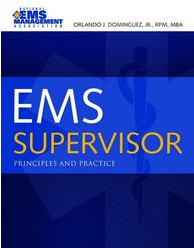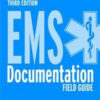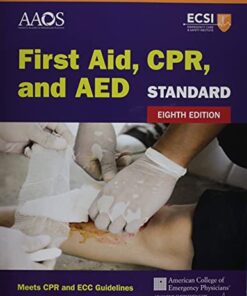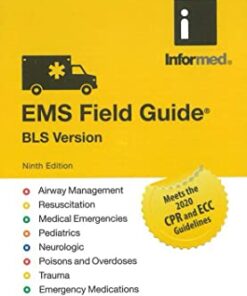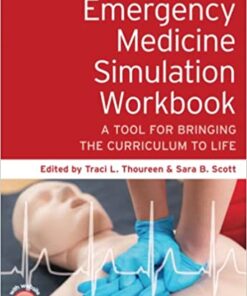- People
- Strategic objectives
- Financial management objectives
- Learning objectives
- A culture of quality
- Type :Original PDF
==========================+======================
Note : We will send ebook download link after confirmation of payment via paypal success . Payment Visa or master card
Contact Email : [email protected]
Orlando DominguezOrlando J. Dominguez, Jr. has been involved in EMS for more than 25 years, including 21 years with the Brevard County Fire Rescue Department in Brevard County, FL. He has served as a firefighter/paramedic, flight paramedic, EMS Training Captain, Public Information Officer, EMS Division Captain, and Division Chief of EMS. As the Division Chief of EMS, Mr. Dominguez manages all phases of EMS service delivery, including EMS care provided by 450 EMS professionals, as well as coordination between the department and all jurisdictional medical facilities. He has two graduate degrees from Webster University (Master’s degrees in Business Administration and Management and Leadership) and has completed several post-graduate training courses in Six Sigma and Executive Leadership. Mr. Dominguez has been an EMS educator for more than 20 years and has authored more than 20 EMS-related papers.
Emergency medical services (EMS) personnel are thoroughly trained and educated in patient care. They put their knowledge and skills into action at a moment’s notice to treat patients’ illnesses and injuries and to save lives. But what happens when EMS practitioners advance to leadership positions and take on responsibilities beyond patient care?EMS Supervisor: Principles and Practice provides the new or aspiring EMS officer guidance in confronting common challenges faced by those in EMS managerial leadership roles. As an EMS officer, you will be responsible for operations and administration, and the ability to manage and lead will be critically important.
EMS Supervisor: Principles and Practice offers an introduction to creating and maintaining a successful EMS organization through chapters on managerial leadership, team building, professional communications, quality improvement, customer service, strategic planning, crisis management, and budgeting. Establishing knowledge and authority in these areas is crucial to success as an EMS officer.
The concept of five key business priorities (5 BPs), reinforced in each chapter, underlines the primary considerations for EMS officers taking on new responsibilities:
Additional features highlight managerial leadership tips, examples of management decisions in the business world outside of EMS, and fictional case studies to stimulate discussion of how EMS officers can resolve challenging situations.
EMS Supervisor: Principles and Practice meets the course outcomes for the National Fire Academy’s Fire and Emergency Services Higher Education (FESHE) Emergency Medical Services Curriculum Management of Emergency Medical Services course. Published in partnership with the National EMS Management Association.
Related Products
EMERGENCY MEDICINE BOOKS
Emergências Neurocirúrgicas, 3rd Edition (Original PDF from Publisher)
EMERGENCY MEDICINE BOOKS
Point of Care Ultrasound in Critical Care (ePub+Converted PDF)
EMERGENCY MEDICINE BOOKS
Receituário de Bolso: Emergências Médicas, 1st edition (Original PDF from Publisher)
EMERGENCY MEDICINE BOOKS
AMLS: Advanced Medical Life Support, 3rd edition (Original PDF from Publisher)
EMERGENCY MEDICINE BOOKS
EMERGENCY MEDICINE BOOKS
EMERGENCY MEDICINE BOOKS
100 Cases in Acute Medicine, 2nd Edition (Original PDF from Publisher)
EMERGENCY MEDICINE BOOKS
Emergenze respiratorie. La gestione del paziente acuto e critico (EPUB3)
EMERGENCY MEDICINE BOOKS
EMERGENCY MEDICINE BOOKS
EMERGENCY MEDICINE BOOKS
The Walls Manual of Emergency Airway Management, 6th Edition (EPUB3)
EMERGENCY MEDICINE BOOKS
The Washington Manual of Emergency Medicine, SAE (Original PDF from Publisher)
EMERGENCY MEDICINE BOOKS
MCQS in Critical Care Medicine (Original PDF from Publisher)
EMERGENCY MEDICINE BOOKS
Mechanical Circulatory and Respiratory Support (Original PDF from Publisher)
EMERGENCY MEDICINE BOOKS
EMERGENCY MEDICINE BOOKS
EMERGENCY MEDICINE BOOKS
EMERGENCY MEDICINE BOOKS
Critical Care Transport, 3rd Edition (Original PDF from Publisher)
EMERGENCY MEDICINE BOOKS
Evolution of EMS: COVID-19 Guidance for EMS Providers (Original PDF from Publisher)
EMERGENCY MEDICINE BOOKS
Emergency Pediatric Care Course Manual, 4th Edition (Original PDF from Publisher)
EMERGENCY MEDICINE BOOKS
French AMLS: Support Avance De Vie Medicale, 3e Édition (Original PDF from Publisher)
EMERGENCY MEDICINE BOOKS
Advanced First Aid, CPR, and AED, 8th Edition (Original PDF from Publisher)
EMERGENCY MEDICINE BOOKS
Standard First Aid, CPR, and AED, 8th Edition (Original PDF from Publisher)
EMERGENCY MEDICINE BOOKS
Emergencies in Neuromuscular Disorders (Original PDF from Publisher)
EMERGENCY MEDICINE BOOKS
EMERGENCY MEDICINE BOOKS
EMERGENCY MEDICINE BOOKS
EMS Field Guide BLS Version: Revised 2021, 9th Edition (Original PDF from Publisher)
EMERGENCY MEDICINE BOOKS
EMERGENCY MEDICINE BOOKS
Emergency & Critical Care Pocket Guide, Revised Eighth Edition (Original PDF from Publisher)
EMERGENCY MEDICINE BOOKS
EMERGENCY MEDICINE BOOKS
Neuromonitoring in Neonatal and Pediatric Critical Care (Original PDF from Publisher)
EMERGENCY MEDICINE BOOKS
Emergency Imaging of At-Risk Patients: General Principles (Original PDF from Publisher)
EMERGENCY MEDICINE BOOKS
Manual of Eye, Ear, Nose, and Throat Emergencies (Volume 1) (EPUB)
EMERGENCY MEDICINE BOOKS
Bien débuter – Urgences (French Edition) (Original PDF from Publisher)
EMERGENCY MEDICINE BOOKS
Cases in Pre-Hospital and Retrieval Medicine, 2nd edition (Original PDF from Publisher)
EMERGENCY MEDICINE BOOKS
Perioperative Quality Improvement (Original PDF from Publisher)
EMERGENCY MEDICINE BOOKS
Practical Guide to Interventional Pulmonology (Original PDF from Publisher)
EMERGENCY MEDICINE BOOKS
The Toxicology Handbook, 4th edition (Original PDF from Publisher)
EMERGENCY MEDICINE BOOKS
Atlas of Emergency Medicine Procedures, 2nd Edition (Original PDF from Publisher)
EMERGENCY MEDICINE BOOKS
EMERGENCY MEDICINE BOOKS
Atlas of Emergency Imaging from Head-to-Toe (Original PDF from Publisher)
EMERGENCY MEDICINE BOOKS
Emergency Medicine Board Review for the Visual Learner (Original PDF from Publisher)
EMERGENCY MEDICINE BOOKS
Arterial Blood Gas Interpretation in Clinical Practice (Original PDF from Publisher)
EMERGENCY MEDICINE BOOKS
Der Praxisanleiter im Rettungsdienst, 2e (German Edition) (Original PDF from Publisher)
EMERGENCY MEDICINE BOOKS
Oncologic Emergency Medicine: Principles and Practice, 2nd Edition (Original PDF from Publisher)
EMERGENCY MEDICINE BOOKS
Textbook of Critical Care including Trauma And Emergency Care, 2nd edition (Converted PDF)
EMERGENCY MEDICINE BOOKS
EMERGENCY MEDICINE BOOKS
EMERGENCY MEDICINE BOOKS
Occupational Therapy in Acute Care, 2nd Edition (Original PDF from Publisher)
EMERGENCY MEDICINE BOOKS
EMERGENCY MEDICINE BOOKS
Navigating the ICU: A Guide for Patients and Families (EPUB)
EMERGENCY MEDICINE BOOKS
Communication in Emergency Medicine (Original PDF from Publisher)
EMERGENCY MEDICINE BOOKS
Eye Movements in the Critical Care Setting (Original PDF from Publisher)
EMERGENCY MEDICINE BOOKS
Tratado de medicina intensiva, 2nd edition (Original PDF from Publisher)
EMERGENCY MEDICINE BOOKS
Mechanical Ventilation from Pathophysiology to Clinical Evidence (Original PDF from Publisher)
EMERGENCY MEDICINE BOOKS
Critical Care of COVID-19 in the Emergency Department (Original PDF from Publisher)
EMERGENCY MEDICINE BOOKS
Handbook of Intravenous Fluids (Original PDF from Publisher)
EMERGENCY MEDICINE BOOKS
Rapid Interpretation of Ventilator Waveforms, 3rd Edition (EPUB)
EMERGENCY MEDICINE BOOKS
EMERGENCY MEDICINE BOOKS
CMC Vellore Handbook of Emergency Medicine, 3rd Edition (Original PDF from Publisher)
EMERGENCY MEDICINE BOOKS
Textbook of Emergency & Trauma Care (Original PDF from Publisher)
EMERGENCY MEDICINE BOOKS
A Guide to Mechanical Ventilation in Emergency Room, 2nd Edition (Original PDF from Publisher)
EMERGENCY MEDICINE BOOKS
EMERGENCY MEDICINE BOOKS
Annual Update in Intensive Care and Emergency Medicine 2022 (Original PDF from Publisher)
EMERGENCY MEDICINE BOOKS
EMERGENCY MEDICINE BOOKS
Fundamentals of Pharmacology for Paramedics (Original PDF from Publisher)
EMERGENCY MEDICINE BOOKS
Preparing Nurses for Disaster Management: A Global Perspective (EPUB + Converted PDF)
EMERGENCY MEDICINE BOOKS
Pocket Emergency Medicine, 5th Edition (EPUB + Converted PDF)
EMERGENCY MEDICINE BOOKS
The Washington Manual of Critical Care, SAE (Original PDF from Publisher)

